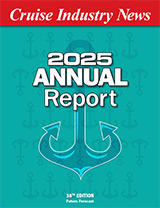The October 1995 bankruptcy of Regency Cruises is still unsettled and a final conclusion may not occur until year’s end – more than two years after the line filed for Chapter 11.
At press time, the case proceeds as a Chapter 11 bankruptcy with a plan for liquidation and passengers and agents still await reimbursement.
A resolution had seemed imminent in February when it was reported by Cruise Industry News that Freehill, Hogan & Mahar – the legal representative for Newcastle Protection & Indemnity Association – expected to issue reimbursement notices to roughly 4,000 claimants, representing 11,000 passengers, for about $3 million in payments starting in March.
Three months later, notification had not begun, and the process is now set to start in 30 to 60 days. When they are finally issued, the reimbursement payments will come from a $15 million Federal Maritime Commission (FMC) bond, a mandatory posting by cruise operators as evidence of their financial responsibility to indemnify passengers in the event of non-performance of transportation for certain passenger-carrying vessels that embark passengers at U.S. ports.
No Coverage
In the Regency situation, however, thousands of passengers had booked passage on ships departing non U.S. ports, and therefore are not eligible to recoup lost monies through the FMC guaranty.
Zachary Kass, an attorney at Robinson Silverman Pearce Aronsohn & Berman LLP, which is representing the group of unsecured creditors, said a significant number of passengers and agents do not qualify for the FMC coverage and therefore have filed as unsecured creditors.
Kass added that his flrm has sought recourse to bend the strict language and interpretation of the FMC requirements, but to no avail. “We have been working to convince the bankruptcy judge or Newcastle itself to extend the scope of coverage,” said Kass.
Kass also estimated that unsecured creditors will most likely be paid 25 to 30 cents on the dollar.
Additional money could come from an ongoing lawsuit filed by creditors against the issuer of Regency’s corporate insurance policy and the former officers of Regency, he said.
According to Kass and other sources, the Regency hearing bas been hampered by the high number of claimants, as well as by some jockeying between secured and unsecured creditors for pay-outs.
“Everything has taken longer than we had hoped for,” noted Kass.



